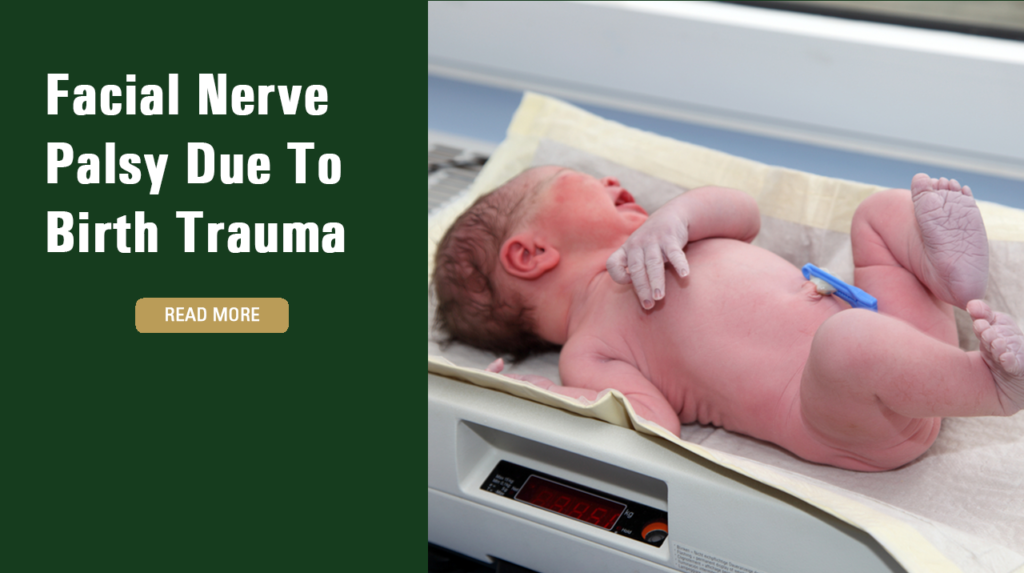Facial Nerve Palsy Due To Birth Trauma

During labor and delivery in Pennsylvania, any number of things can go wrong. When the labor and delivery staff fail to take appropriate care during childbirth, either the mother or infant can suffer injuries and harm. One type of complication that can be caused by birth trauma is a condition called facial nerve palsy, which is also commonly known as Bell’s palsy. While this might only be temporary, some cases can involve long-lasting effects and disfigurement. If your child suffered Bell’s palsy as a result of the negligence of the labor and delivery staff, a birth trauma attorney at Raynes & Lawn can help you understand your rights and the potential legal remedies.
What Is Facial Nerve Palsy?
Facial nerve palsy involves damage to the seventh cranial nerve, which is also called the facial nerve. The seventh cranial nerve is comprised of nerve fibers that control facial expression and movement. It also includes nerve fibers that control the taste sensation in the front two-thirds of the tongue and fibers that innervate the lacrimal gland for the production of tears. Bell’s palsy can result when the facial nerve is injured. This can occur during labor and delivery when the baby suffers trauma during a difficult birth or when certain tools such as forceps are used. Facial nerve palsy can result in the infant’s loss of voluntary muscle movement because of pressure placed on the seventh cranial nerve during delivery or at the time the infant is born.Bell’s palsy is more common when a baby is abnormally large, which can occur if the mother has gestational diabetes. It can also happen when the mother’s labor is prolonged or difficult. Facial nerve palsy sometimes occurs as a result of an epidural anesthetic or the use of medication to induce labor.
In cases caused by birth trauma, the lower portion of the seventh cranial nerve is most often affected and can cause the following symptoms:
- One side of the mouth not pulling down when crying, resulting in an asymmetrical appearance
- Unevenness of the area between the eyes when the baby cries
- Eyelid on one side not blinking or fully closing
- Minimal movement or a complete lack of movement on one side of the face
What Are The Causes Of Facial Nerve Palsy?
Facial nerve palsy can be caused by numerous factors. In some cases, the cause is unknown. When it occurs in infants, there are three primary causes of Bell’s palsy, including birth injuries, head injuries, and viral infections.
Birth injuries are a leading cause of Bell’s palsy in newborns. An infant can suffer a birth injury when a doctor administers anesthesia or medication to induce labor. The improper use of forceps by an obstetrician during labor and delivery can also injure the facial nerve and cause Bell’s palsy.

In some cases, a doctor or another medical provider might accidentally injure the head of the newborn. Since infants are vulnerable, a small injury can result in damage to the nerve and chronic facial nerve palsy. Certain types of viral infections have also been linked to facial nerve palsy. In some cases, these types of infections and the resulting harm can be prevented through careful monitoring and appropriate intervention.
How To Prove A Child’s Facial Nerve Palsy Was Caused By Negligence
Not all cases of facial nerve palsy will form the basis of a medical negligence claim against the medical providers.
Instead, you will have to present evidence to prove each of the following elements:
- There was a provider-patient relationship.
- The provider’s care violated the expected standard of care.
- The violation of the standard of care caused the infant’s facial nerve palsy.
- The infant and family suffered calculable damages as a result.
Proving that the care provided by the doctor fell below the expected standard of care and that the deviation from the standard of care caused your infant’s facial nerve palsy will require you to work with a medical expert. Pennsylvania requires all medical malpractice plaintiffs to file certificates of merit with the court when they file their lawsuits. A certificate of merit is a statement that your case has been evaluated by a medical expert who can testify that the treatment violated the standard of care and caused the injuries and harm.
Your child injury lawyer will gather and review your medical records and consult with a medical expert. He or she might also review past complaints against the doctor or hospital and explain whether your case has legal merits.
Types Of Compensation In A Case Involving Facial Nerve
- Palsy—The types of compensation that might be available in a case involving facial nerve palsy will depend on several factors, including how long the condition is expected to last, its severity, and others.
Some of the types of damages that might be available include the following:
- Past and future medical costs
- Past and future rehabilitation costs
- Nursing care costs related to the injury
- Pain and suffering
- Permanent disfigurement
Why You Should Speak To A Child Injury Lawyer At Raynes & Lawn
If you believe that your child’s facial nerve palsy might have been caused by the negligence of a medical provider, you should speak to a birth trauma attorney at Raynes & Lawn as soon as possible. One of our experienced lawyers can analyze what happened and provide you with an honest assessment. Birth trauma cases involving facial nerve palsy can be complex and difficult to prove. Without the help of an experienced attorney, you might be less likely to recover compensation. We have more than 50 years of experience fighting for the rights of our clients and recovering the compensation they deserve. To learn more about your potential rights and to schedule a free consultation, call our law firm today at (800) 535-1797.

For the general public: This Blog/Website is made available by the law firm publisher, Raynes & Lawn, for educational purposes. It provides general information and a general understanding of the law but does not provide specific legal advice. By using this site, commenting on posts, or sending inquiries through the site or contact email, you confirm that there is no attorney-client relationship between you and the Blog/Website publisher. The Blog/Website should not be used as a substitute for competent legal advice from a licensed attorney in your jurisdiction.
For attorneys: This Blog/Website is informational in nature and is not a substitute for legal research or a consultation on specific matters pertaining to your clients. Due to the dynamic nature of legal doctrines, what might be accurate one day may be inaccurate the next. As such, the contents of this blog must not be relied upon as a basis for arguments to a court or for your advice to clients without, again, further research or a consultation with our professionals.
